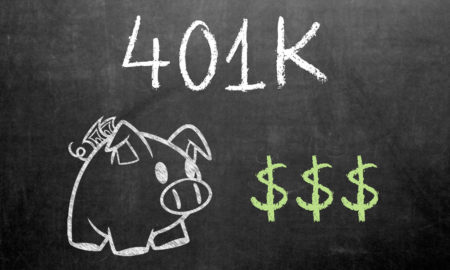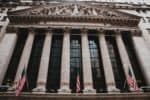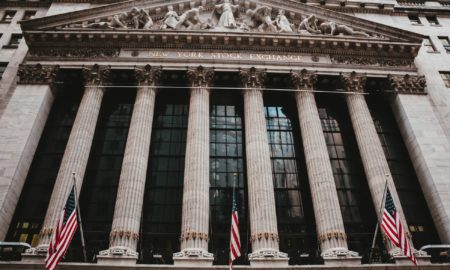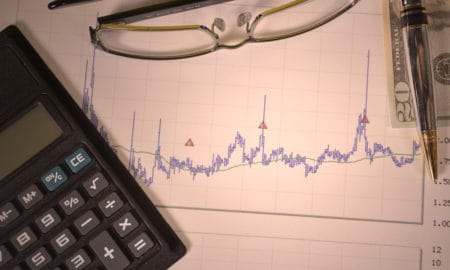

Two weeks ago, Berkshire Hathaway released its 2016 Annual Report to Shareholders, complete with 26 pages of hand-typed wisdom from Mr. Warren Buffett himself.
Buffett, of course, needs no introduction. By the numbers, he’s the most successful investor of all time. He’s the proud owner of a net worth which marches relentlessly higher, currently $60 billion – a number which grows so rapidly it will probably be outdated by the time you read this article.
Berkshire Hathaway’s annual reports on the other hand, may be less well-known. A former textile company, the company has merger’ed and acquisitioned its way into one of the largest conglomerates in the entire world, owning everything from GEICO, Helzberg Diamonds, Dairy Queen, and the BNSF railroad, plus significant holdings of Coca-Cola, Kraft Heinz, American Express, IBM, and tons more.
And at the front of every Berkshire Hathaway Annual Report is one of the most anticipated shows in investing – a letter from Chairman Buffett himself. These letters offer a sort of glimpse into the brilliant investing mind of Mr. Buffett. Their brutal honestly and at times hilarious commentary have propelled Berkshire’s reports to a sort of iconic status within the investment world.
Released just a few weeks ago, this year’s letter did not disappoint.
Aside from Buffett letting the world know he’d rather prepare for a colonoscopy than ever dilute his stock shares, Buffett’s 26-page introduction was filled with its usual investment commentary gold.
Here are some of the biggest lessons:
1. Economic Dips Are Actually Incredible Buying Opportunities
“Every decade or so, dark clouds will fill the economic skies, and they will briefly rain gold. When downpours of that sort occur, it’s imperative that we rush outdoors carrying washtubs, not teaspoons. And that we will do.” – Warren Buffett, 2016 Berkshire Annual Report, pg. 6
Buffett is speaking here on a time tested fact; investing is a bumpy ride, and those who are willing to ride it out are rewarded handsomely. Buffett continues to explain,
“During such scary periods, you should never forget two things: First, widespread fear is your friend as an investor, because it serves up bargain purchases. Second, personal fear is your enemy.”
More than just a bump in the road, market downturns are actually huge sales, and incredible opportunities to forever bolster your portfolio at rock bottom prices!
I was thrust into this lesson at the beginning of my investing career. My first notable stock market investments came during the 2008 financial crisis. I was terrified.
Everywhere I turned and everyone I talked to was warning about the end of the world. People were selling left and right. And prices just kept plummeting.
But by conquering that personal fear and doing my best to catch some of the raining gold pouring out of dark economic clouds, I was able to build up a portfolio of deeply discounted stocks.
Those stocks eventually rebounded and then some. By age 25, I had a $100,000 portfolio thanks to those bargain purchases.
2. Leverage Is Incredibly Powerful
Much speculation has occurred over Buffett’s various investing edges, but Buffett has no qualms about coming right out and revealing his biggest investing advantage:
“Let’s now look at Berkshire’s various businesses, starting with our most important sector, insurance. The property/casualty (“P/C”) branch of that industry has been the engine that has propelled our growth since 1967
…
One reason we were attracted to the P/C business was its financial characteristics: P/C insurers receive premiums upfront and pay claims later. In extreme cases, such as claims arising from exposure to asbestos, payments can stretch over many decades. This collect-now, pay-later model leaves P/C companies holding large sums – money we call “float” – that will eventually go to others. Meanwhile, insurers get to invest this float for their own benefit.”
It’s this ability to invest using other people’s money which has really fueled Berkshire’s growth for decades. Similar to real estate investor using the bank’s money to invest in rental properties, or an entrepreneur starting a business using a loan, the ability to invest other people’s money can propel growth to unbelievable heights.”
Sure, becoming debt free is a noble goal, but let’s also not lose sight that at times, responsibly using leverage can provide incredible investing benefits.
3. And now, for a chant of “USA! USA! USA!”
Buffett stopped in the middle of the report for a brief country-wide pep talk about “American’s economic dynamism.”
“Above all, it’s our market system – an economic traffic cop ably directing capital, brains and labor – that has created America’s abundance.
…
But those venturesome pioneers [early Americans] crafted a system that unleashed human potential, and their successors built upon it.
This economic creation will deliver increasing wealth to our progeny far into the future. Yes, the build-up of wealth will be interrupted for short periods from time to time. It will not, however, be stopped. I’ll repeat what I’ve both said in the past and expect to say in future years: Babies born in America today are the luckiest crop in history.”
It’s quite the vote of confidence from one of America’s brightest minds. Even as at least half the country worries about recent leadership changes, Buffett’s optimism is a comforting reminder of just how lucky we all really are.

“Muuuurica.” – Warren Buffett, 2016 Report to Shareholders*. (*not an actual Warren Buffett quote)
As investors, it’s our duty to realize the potential of such an incredible system.
4. Those High Priced Money Managers Probably Aren’t Worth It
Buffett isn’t shy about calling out all those professional money managers.
“In Berkshire’s 2005 annual report, I argued that active investment management by professionals – in aggregate – would over a period of years underperform the returns achieved by rank amateurs who simply sat still. I explained that the massive fees levied by a variety of “helpers” would leave their clients – again in aggregate – worse off than if the amateurs simply invested in an unmanaged low-cost index fund.
Subsequently, I publicly offered to wager $500,000 that no investment pro could select a set of at least five hedge funds – wildly-popular and high-fee investing vehicles – that would over an extended period match the performance of an unmanaged S&P-500 index fund charging only token fees. I suggested a ten-year bet and named a low-cost Vanguard S&P fund as my contender.”
Only one investment professional was brave enough to take on the challenge of simply beating the index fund. After 9 years, the results aren’t looking pretty:
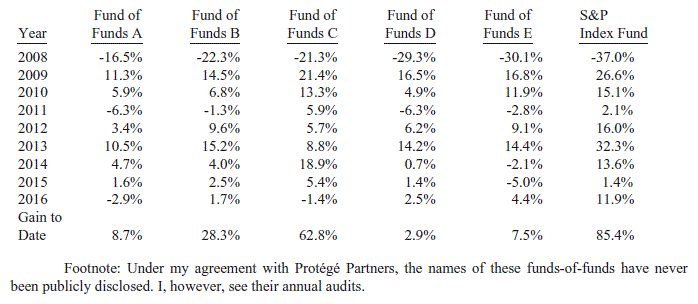 Using a hypothetical $1 million, the index fund would have gained $854,000 compared to the “professionals” who are a whopping $634,000 behind, at only $220,000. Well that’s gotta be embarrassing for the pros…
Using a hypothetical $1 million, the index fund would have gained $854,000 compared to the “professionals” who are a whopping $634,000 behind, at only $220,000. Well that’s gotta be embarrassing for the pros…
5. Meanwhile, Jack Bogle is a Hero for Those Wanting to Avoid the High Priced Pros
Buffett reserves his biggest compliments for the founder of Vanguard:
“If a statue is ever erected to honor the person who has done the most for American investors, the hands-down choice should be Jack Bogle. For decades, Jack has urged investors to invest in ultra-low-cost index funds. In his crusade, he amassed only a tiny percentage of the wealth that has typically flowed to managers who have promised their investors large rewards while delivering them nothing – or, as in our bet, less than nothing – of added value.
In his early years, Jack was frequently mocked by the investment-management industry. Today, however, he has the satisfaction of knowing that he helped millions of investors realize far better returns on their savings than they otherwise would have earned. He is a hero to them and to me.”
And with, that we close on Buffett’s consistent message for the average investor (and also, his message for Lebron James). The best choice for those of us wanting to maximize our stock market returns is also the simplest, just invest in the index fund already!

